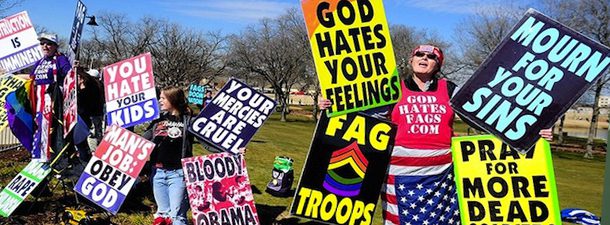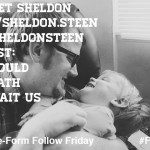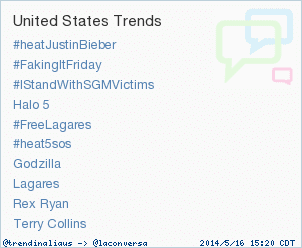Fred Phelps is dead.
And while the Westboro cult itself is refusing to mourn (“We don’t worship the dead”), some counter-protesters at yesterday’s Lorde concert in Kansas City graciously expressed counterintuitive condolences for the hate-group’s loss.
When Phelps’s death was announced a few days ago, it didn’t take long for evangelical condemnations to hit my feeds, some of them fierce, some of them kinder and more forgiving. Some Christians were quick to consign Phelps himself to the fiery hatred of God. Others expressed condolences amidst the condemnation of their hateful message. But one thing is very clear: pretty much all American evangelicals want to distance themselves from anything remotely resembling Westboro Baptist theology and expression – and understandably so.
About five years ago, Westboro came to Vermont to picket the statehouse over the recent legalizing of gay marriage. Not ones to waste a trip, they also stopped at a synagogue in my home city of Burlington. I saw the protest on my way to the store and pulled over, managing to get close enough to have a conversation with one of the Phelps grandkids, Jael. She was in her early 20’s and highly combative as I asked her questions about Jesus’s Jewishness. The thing was, her arguments, and even her style of argumentation, were not all that different from the conservative Christianity I had spent so much of my life in, to the degree that I was able to easily anticipate her next zinger throughout our brief talk.
The other takeaway from that experience was the fact that Jael was simply a completely brainwashed young woman, living in what amounts to an alternate reality, which is the trademark of cults. Getting so close and engaging her calmly allowed me to see her as a tragically confused human being. I could relate to her, too, because I had grown up in a high-control, cultish Christian expression.
I felt compassion for her.
All of this to say, the reality of Westboro closes the distance on the perceptions and projections. In reality, Westboro may not be that far removed from conservative evangelicalism in America, either in theology or expression. And, Phelps’s death may be providing us with a moment to more deeply examine ourselves, to see if evangelical Christianity is harboring some of the same deep flaws that Westboro simply put on glaring display. As Matthew Paul Turner wrote in his Daily Beast column today:
The lines of fundamentalism are blurrier today than what they once were. Most of today’s conservative evangelicals don’t seem all that angry; they don’t spend much time boasting about things like hell or promoting their assumptions about America’s coming doom or theologizing their cases against homosexuality, and they rarely carry their doctrines around on signs. But when push comes to shove or a vote comes to the ballot booth, is their God all that different from Fred’s God?
When, for instance, neo-Calvinist Christians believe that God “savingly” loves only a small minority of the human race and “hates” the rest because of their sin – even though they can do nothing to turn away from it unless God unilaterally chooses them – then what, really, is the difference? Certainly, this was the bedrock belief of Fred Phelps. His minority may have been smaller – the members of Westboro – but that difference in size is not a difference in theological kind. While new Reformed evangelicals would be quick to object that if God hates the nonelect, that is up to him, and the church is commanded to love, I simply doubt that objection will be enough to ward off the dysfunctional effects on a community that believes in such hate at the core of God’s character.
Likewise, a belief in eternal conscious torment for all unbelieving sinners in hell (a near-universal for mainstream conservative evangelicals) almost necessarily implies the slogans of Westboro – though evangelicals would never display these implications with such gaudy profanity. That is, non-Christian soldiers killed in action are not heroes to God – they are hated sinners, bound for the flame. And, if evangelicals hold tightly to the flat declaration that “homosexuals…will not inherit the kingdom of God”, does this not equate, at some level, to the final pronouncement that God hates them? Sure some of the other slogans are ridiculous, but the core beliefs of Westboro, printed in tie-dye and shouted in protest, are present here, at least in seed form.
Finally, the political dimension of American evangelical belief in this regard is most telling. While there are no angry protests at big events (or relatively few), there is plenty of anger and protest over the legislative movement to recognize LGBT people as a valid identity group who deserve fair treatment and equal rights under law. When the recent bill was passed (and vetoed) in Arizona outlining protections for religious business owners to deny service to gay people, the best and brightest conservative evangelicals seem to come out with the most alarming responses. I engaged with two Gospel Coalition leaders who continually compared refusing service to a gay person with refusing service to the KKK, or worse, refusing to “serve lemonade at a lynching.”
These are desperate and offensive false analogies that are almost custom-made for a Westboro sign.
And they are revealers of the deep double standard at work when evangelicals condemn Westboro in one breath and justify discrimination with racist analogies in another.
I wonder if the thing that God really hates are these double standards. [Tweet This]
I know we have to rethink our hermeneutics and do some serious spiritual discernment to get there, but perhaps the hell Jesus was warning of is precisely this kind of dehumanizing deception packaged with logic and smiles. After all, these beliefs are exactly the things that cause us to accept an alternative reality that demonizes the other and justifies ourselves. The precise thing Jesus came to stop. The precise issue that evoked his own anger in the form of a whip in the Temple (not, by the way, at a gay wedding). The precise thing that animated all the prophets, and often lead to their deaths.
Conservative evangelicals, I understand. I have been there. I feel compassion.
But we have to stop with this double standard.
We have to get back to a God who actually looks like Jesus.
And really, truly looks nothing like Fred Phelps and the Westboro cult.
By God’s grace, let it be so.












